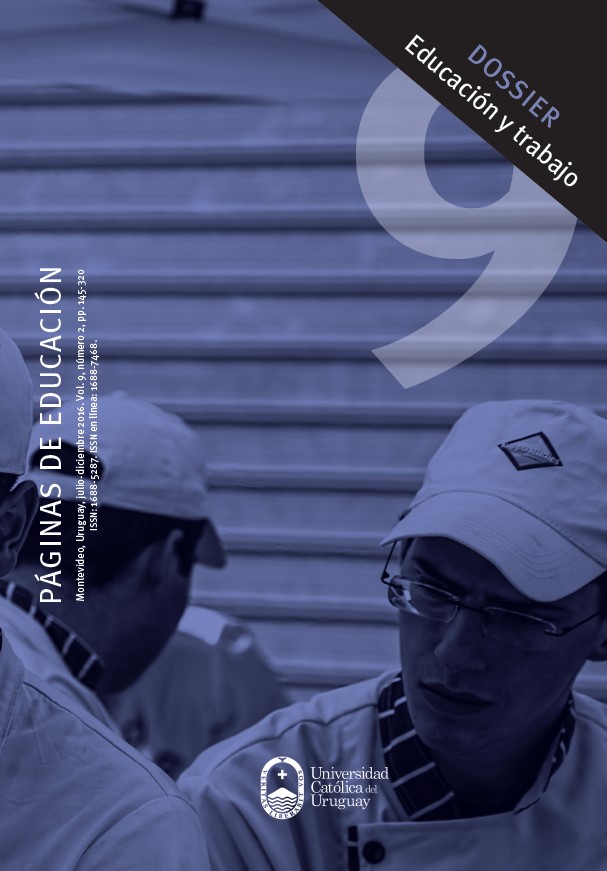Isabel puts in letters their claims: Teachers and epistolarios. Rosario, Argentina (1875 – 1879)
DOI:
https://doi.org/10.22235/pe.v9i2.1300Keywords:
school, normal education, teachers - lettersAbstract
The present work aims to analyze two topics around three words: school, teacher and letter. The first commitment is compromised to think how the rise of Argentine Educative System operated over the female teachers’ participation in the educational practices. At the end of the nineteenth century, the Argentine Estate considered that the female figure was the most suitable to drive the civilizing act of the normal school. These beliefs were justified by her “natural gifts”: care and predisposition towards others. In a second commitment, we extrapolate this question to reflect how this prescription was reformulated by the own women to escape from the private domestic space in order to establish new relationships and negotiations in spaces which belonged to male (public) and males (institutions and ministry agents). Investigate the ability of these women claim that the teachers have to petition on what they consider fair and thus himself, his ability to challenge the essentialist discourses on "teacher " that circulated at the time. This life experience will be analyzed from letters written by a young foreign teacher: Isabel Coolidge.Downloads
References
Barrancos, D. (2001). Inclusión/exclusión. Historia con mujeres. Buenos Aires: Fondo de Cultura Económica.
Carvalho, E. y Colovini, J. (2002). Colegio nacional de rosario: orígenes, fundación y primeros tiempos. Crónica documentada. Rosario: Asociación Ex Alumnos Colegio Nacional N°1 y Asociación Cooperadora Colegio Nacional N°1.
Castillo Gómez, A. (2005). El mejor retrato de cada uno. La materialidad de la escritura epistolar en la sociedad hispana de los siglos XVI y XVII. Hispania, LXV/3 (221), 847-876.
Chambers, S. C. (2005). Cartas y Salones: mujeres que leen y escriben la nación en la Sudamérica del siglo XIX Araucaria. Revista Iberoamericana de Filosofía, Política y Humanidades, 7 (013), 77-106.
De Certeau, M. (2000). La invención de lo cotidiano. México: Cultura Libre.
De Certeau, M. (1974). L'opération historique. Le Goff, J. y Nora, P. (Dirs.) Faire de l'histoire. Tome I: Problèmes Nouveaux. París: Gallimard.
Fernández, S. y Caldo, P. (2013). La maestra y el museo. Rosario: El ombú bonsái.
Fraser, N. (1993). Repensar el ámbito público: una contribución a la crítica de la democracia realmente existente. Debate Feminista, 7 (4), 23-58.
Guha, R. (2002). Las voces de la historia y otros estudios subalternos. Barcelona: Crítica.
Lionetti, L. (2007). La misión política de la escuela pública: educar al ciudadano de la república (1870-1916). Buenos Aires: Miño y Dávila.
Morgade. G. (Comp.). (1997). Mujeres en la educación. Género y docencia en la Argentina 1870-1930. Buenos Aires: Miño y Dávila.
Rockwell, E. (1997). Hacer escuela, hacer estado: la educación posrevolucionaria vista desde Tlaxcala. México: Centro de Investigaciones y Estudios Superiores en Antropología Social (CIESAS) y Centro de Investigación y de Estudios Avanzados (Cinvestav).
Sarmiento, D. F. (2011) Educación popular. La Plata: Unipe Editorial Universitaria.
Yannoulas, S. (1996). Educar: ¿una profesión de mujeres? La feminización del normalismo y la docencia (1870 – 1930). Buenos Aires: Kapeluz.















